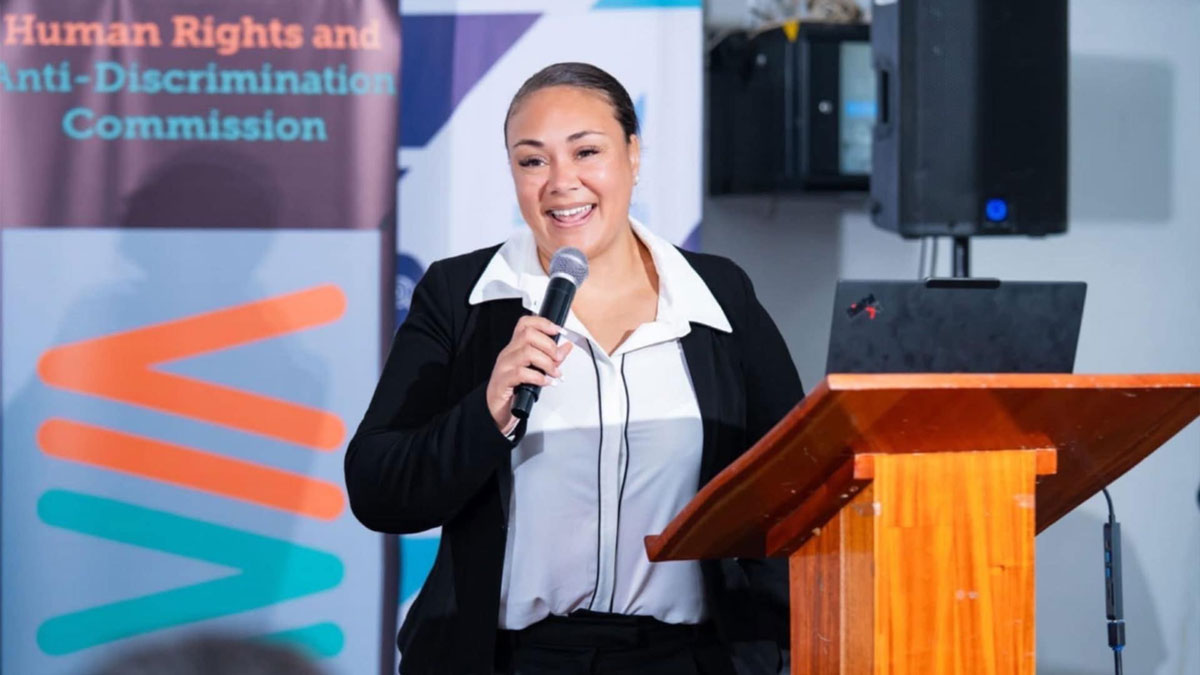
Why are our rugby players discriminated against on the global stage and continue to face racial abuse and unfair treatment, both on and off the field and why this is accepted.
This was raised and questioned by Super Rugby commentator and former Fijiana 15s captain Lailanie Burnes during the International Day for the Elimination of Racial Discrimination.
Burnes says sport is a reflection of society and that is why unfortunately, racism is found in sports.
She says this can be seen in various degrees from spectators and social media trolls but at times can also make us question the motives behind some officiating and institutional decisions.
She highlighted instances where Fijian players were subjected to treatment that could potentially be seen as racially discriminatory.
She says one such instance occurred last year during the Barbarians Test matches, where Fijian national players were denied release by their clubs to represent their country, while players from the same clubs were allowed to play for the Barbarians.
She left the question open for consideration: Is this a form of racism?
Further fuelling the discussion, she pointed out that Fijian Drua halfback Frank Lomani was subjected to racial abuse by a Melbourne Rebels fan after receiving a red card.
Burnes says the former coach of both the Fijian Drua team and current head coach of the Flying Fijians, Mick Byrne voiced concerns about the Super Rugby season debut of the Fijian Drua.
She says Byrne noted that 80 percent of the tries scored by the team were subjected to TMO reviews, with 8 out of every 10 tries being scrutinized for validity – a disparity that raises questions.
Additionally, she brought attention to a troubling incident where the Fijian Drua team was transported in the back of a truck due to a lack of proper transport, prompting the question.
She asks why is such treatment accepted for our players.
Burnes says these instances underline ongoing challenges Fijian players face and raise important questions about fairness, equality and respect in the sport.
She further says a young Fijian rugby player, Isireli Temo, who moved to France to pursue his dream of playing professionally, faced severe discrimination, poor living conditions and what has been reported as inadequate support.
She adds that these challenges became too much for him and he tragically committed suicide.
Reports of Fijian and Pacific players being subjected to racist slurs, both on the field and online have become all too familiar.
Burnes says even renowned players like Nemani Nadolo have fallen victim to such abuse, with the former Fijian international being called a "monkey" while playing in Europe.
She says while many would like to view these incidents as isolated, they are part of a disturbing trend that impacts Pacific Island players across Australia, New Zealand, Europe, and the UK.
Burnes also highlighted the case of former Fiji representative Iosifa Tiroga, who endured repeated racist abuse while playing in France.
She says Tiroga was told he did not belong on the rugby field and was cruelly instructed to "go back to the jungle." With some fans mocking him further by offering him a banana, in a clear and offensive racial taunt.
Further adding to the concern, Burnes raised the issue of dangerous play against Fijian Drua players going unpunished.
She pointed to a recent match against the Waratahs, where illegal tactics such as headlocks and improper binding during mauls were overlooked by officials, raising serious questions about the fairness and consistency of match officiating.
She says these ongoing incidents call attention to the broader issue of racism and the need for stronger action to protect players from discrimination and ensure fair treatment for all.
She questioned that if a tier 1 team had been in the same situation, would the response have been the same?
She says only 12 teams are classified as tier 1, while over 120 teams, including Fiji, fall into tier 2 or lower.
She further says this imbalance contributes to decision making with a larger percentage of voting power going to Tier 1 teams in comparison to the Tier 2 and below.
Burnes says a recent report from the UTS shows the extent of racism in Australian sports, revealing that 50% of AFL fans, 36% of NRL spectators, and 27% of A-League men's fans have witnessed racist behavior.
She says that the alarming trend shown in this report is that racism in sports is getting worse and findings show that it is passed down through generations as children mimic what they see in these stadiums.
She further says many fans dismiss racist behavior as banter or something said in the heat of the moment, failing to recognise how this attitude reinforces the problem.
Burnes says there is little to no research on racism in women’s rugby, especially in Fiji and the Pacific.
She says while an NRLW study found that 4% of female rugby players reported experiencing racism, Burnes says women athletes also face additional discrimination, including sexism and body shaming.
She calls on Pacific universities and researchers to conduct more studies to expose the extent of racism in women’s rugby.
Burnes emphasized that while World Rugby, Oceania Rugby and Fiji Rugby all work diligently to uphold the values of the sport and create a safe and inclusive environment through various programs etc, for everyone both on and off the field, it is ultimately the responsibility of each individual to ensure that racism is not tolerated in any form.
She says this commitment goes beyond rugby or sport it extends to society as a whole.
She adds that by standing together, we can foster a culture of respect, inclusivity and fairness, ensuring that these values are upheld both in sport and in everyday life.
Stay tuned for the latest news on our radio stations

